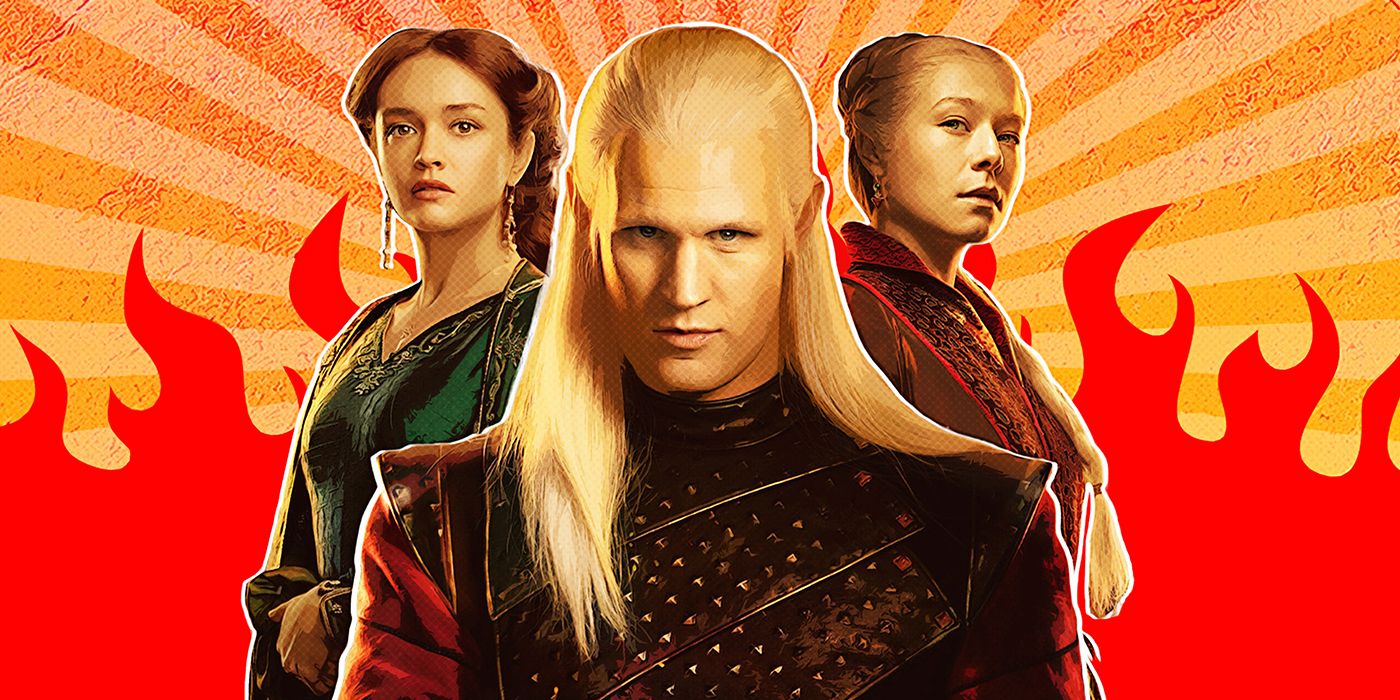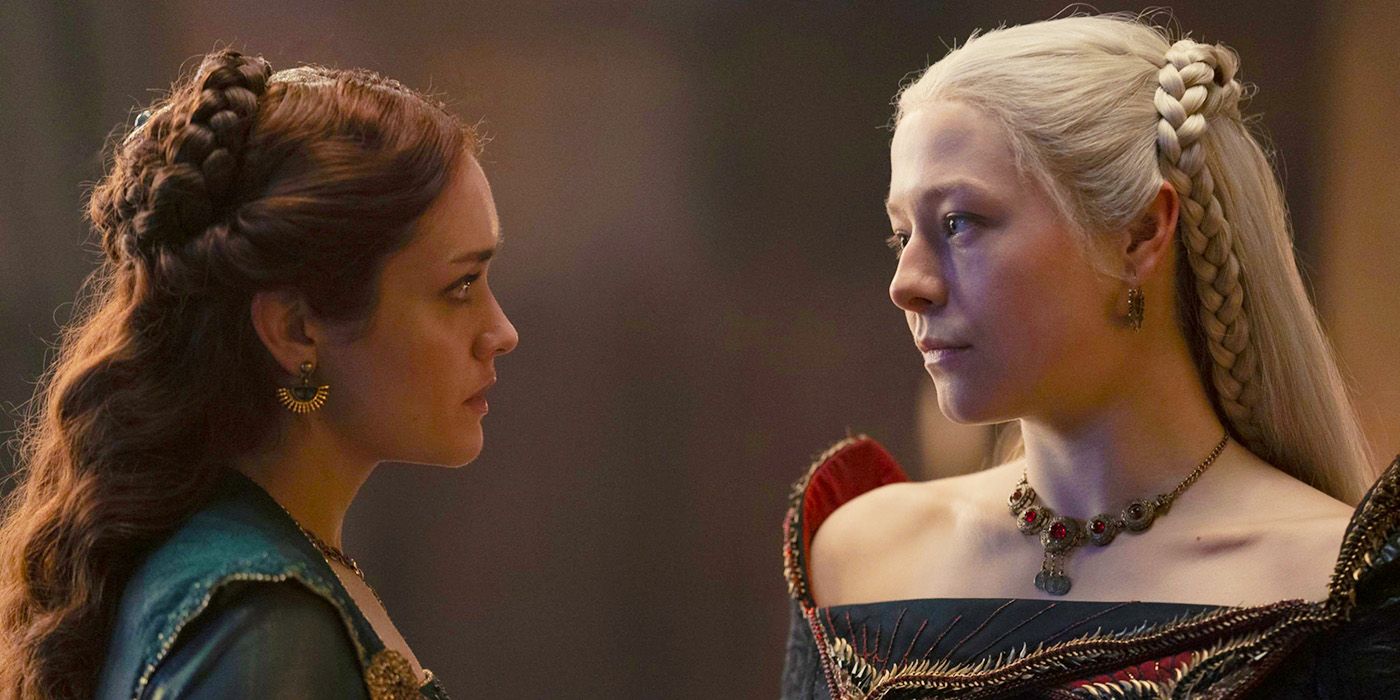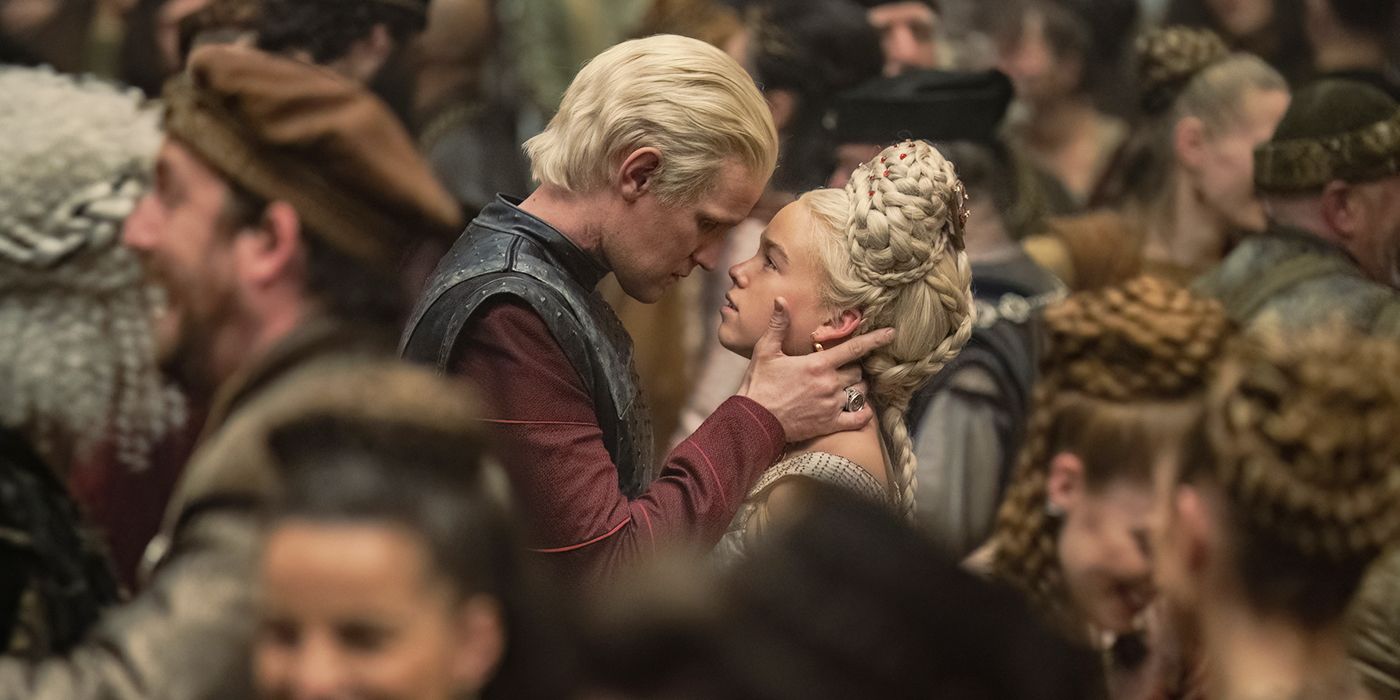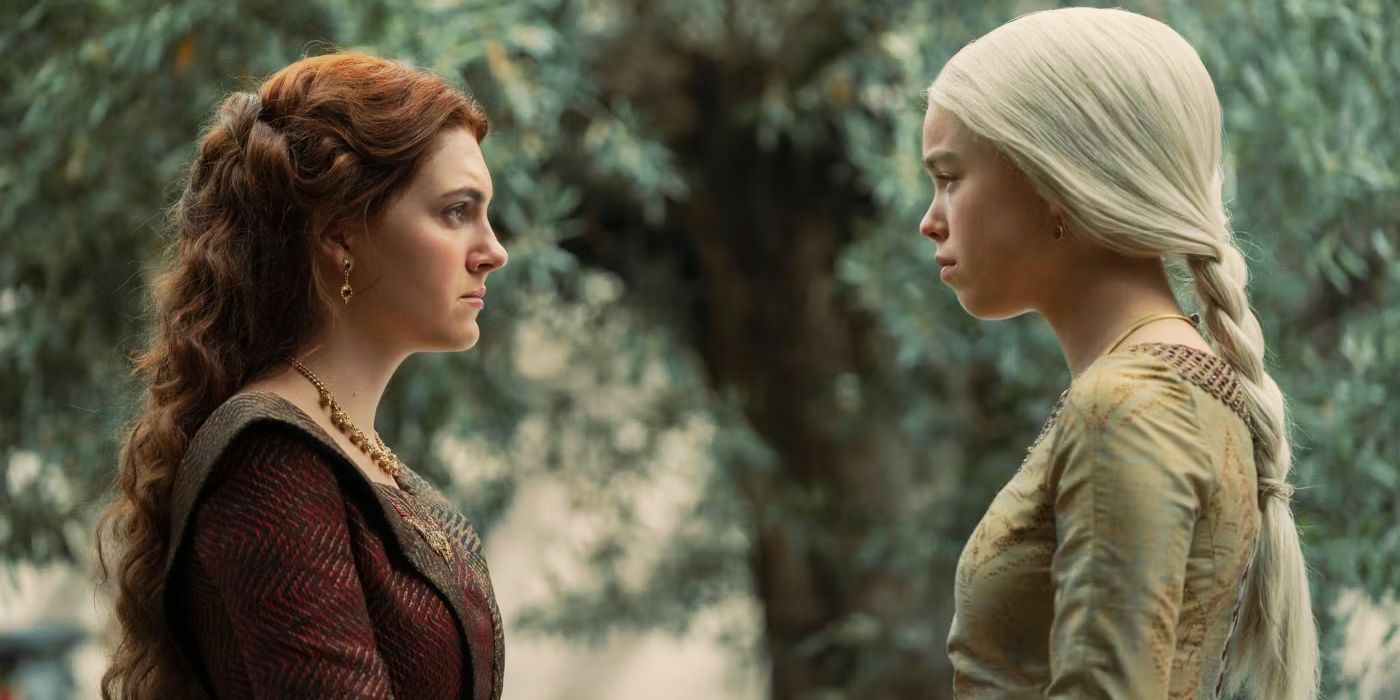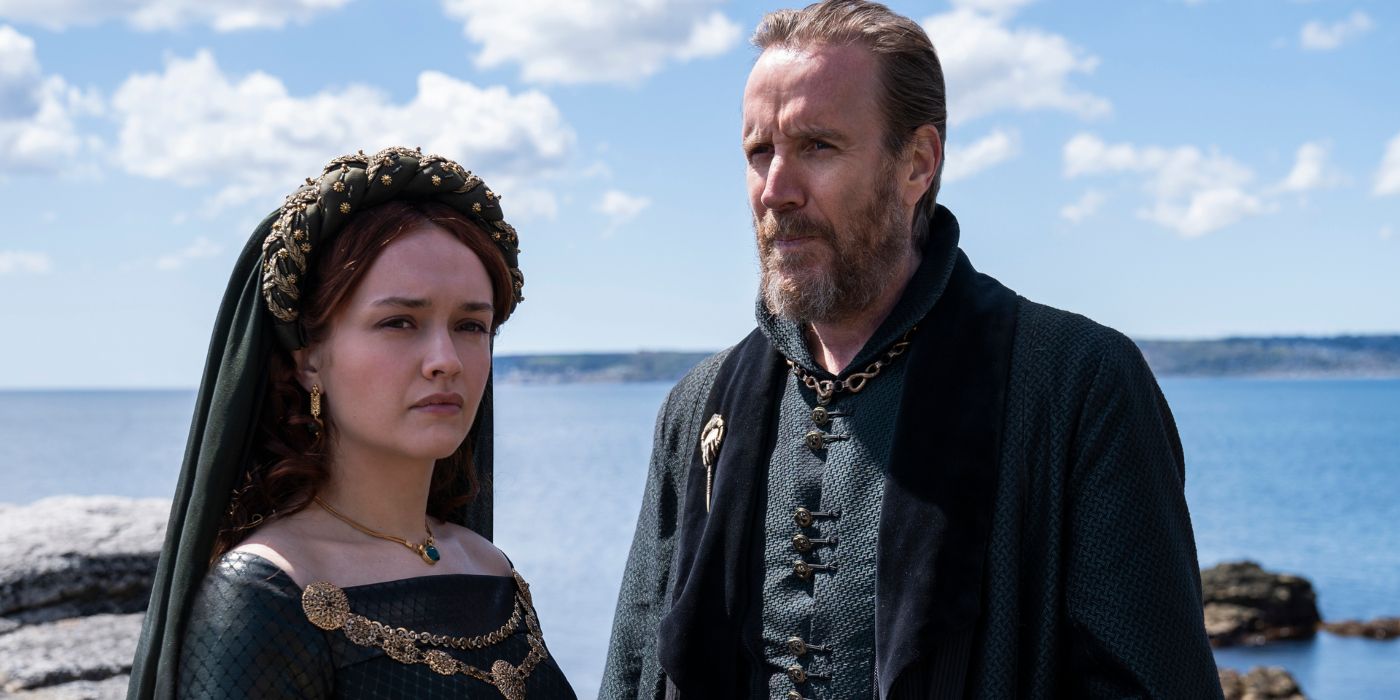Editor's Note: The following contains spoilers for Episodes 1-6 of House of the Dragon.Who will sit on the Iron Throne? It’s the question at the heart of House of the Dragon, just as it was in Game of Thrones. And part of the fun of watching both shows is deciding who you want to take the seat after forming attachments to the wide assortment of characters and cheering for your preferred candidate to get the coveted prize of ruling Westeros. But should we really be cheering for any of the characters on House of the Dragon? It’s a complicated question and to answer it one must look closely at the morality, or lack thereof, shown in George R.R. Martin’s fictional world.
Both Sides of the Dance of Dragons Are Going After Power
House of the Dragon, Game of Thrones, and Martin’s A Song of Ice and Fire novels they’re based on provide a brutally honest look at the sword and sorcery genre. It’s not that Martin’s world is more realistic than that of other fantasy stories (House of the Dragon and the others do feature plenty of the mythical beasts, among other fictional creatures and forms of magic, after all) but while other entries in the genre romanticize what are essentially modified versions of Earth in medieval times the Song of Ice and Fire universe shows that that kind of society is a horrific one to live in, especially for those without power, but for those who wield it as well. Westeros is a self-perpetuating system of brutality and immorality that warps even everyone and everything in it.
House of the Dragon wades even deeper into this moral quagmire than Game of Thrones did. The earlier series did feature characters who remained more or less righteous throughout, including the Stark family and supporting players like Davos Seaworth (Liam Cunningham) and Samwell Tarly (John Bradley). Yes, even these characters had to make moral compromises on occasion but only after being forced into impossible situations by their enemies, and they were motivated by loyalty to friends and family and even altruistic desires to protect the world. In House of the Dragon, whether they admit it or not, all the major characters introduced so far are motivated in some way or another by the pursuit of power and cementing their family or other group’s station. The show expertly crafts characters who are sympathetic and enticing, encouraging viewer loyalty, while also making it abundantly clear that they are all to some form and degree reprehensible.
Each of the Characters in House of the Dragon Have a Fatal Flaw
Perhaps the clearest example of this is the characterization of the current king, Viserys I Targaryen (Paddy Considine). When he is introduced Viserys seems like another problematic leader, little better than his descendant of the same name in Game of Thrones. In the first episode, consumed by his desire for a son to serve as a direct male heir, he tells his medical staff to put his wife through a treatment meant to save the child during her complicated labor, despite knowing it could very well kill her, which it does, without succeeding in saving the baby.But the other episodes have earned the character if not affection at least sympathy and pity.
He showed some moral fortitude in refusing to marry the 12-year-old Laena Velaryon (Nova Foueillis-Mose) even though doing so would have been the most politically strategic move he could make at the time, and he has refused to go back on his word to his daughter Rhaenyra (Milly Alcock/Emma D’Arcy) that she will be his heir despite political pressure from multiple fronts to do so. But just when one feels themselves starting to like him there is some reminder of that horrific initial sin. This is how it goes with all the major characters on the show, who all prove to have some fatal flaw or another that keeps them from being worthy of full loyalty or leadership.
The series’ leading women, Rhaenyra and her former friend Alicent Hightower (Emily Carey/Olivia Cooke), are the most sympathetic of its main characters so far. Both are exploited and denigrated because of their genders, become the pawns of their fathers, among other things. Rhaenyra is influenced for many years by her uncle Daemon (Matt Smith) until he seduces her in Episode 4 before leaving her alone in a brothel. Alicent is ordered by her father, Otto (Rhys Ifans), to comfort the king after the death of his first wife, leading the much older man to marry and father several children with her.
These mistreatments and their personalities endear the characters to the audience, but both could only be seen as good potential leaders if one is looking at things through the warped lens of Westeros. Both are intelligent but while they occasionally show thoughtful insight into the actual governing of the Seven Kingdoms, they only do so in ways that benefit their own sides in the brewing civil war over leadership, which has consumed them both by the most recent episode, in which their friendship has dissolved completely into an icy feud over whose children will rule.
Their respective claims to the throne, and the idea of Targaryen rule in general are also extremely antiquated by modern standards. Whether one believes any kind of monarchy is righteous or not the Targaryen dynasty is built on the thin and immoral foundation of might making right. The Targaryens, and their relatives the Velaryons, believe they are higher people with a divine right to rule because of their bloodlines’ connection to Old Valyria. This kind of thinking, that genetics can make a person superior to others, is what leads to horrors like racism, eugenics, and, as Martin’s world often shows, incest. What actually allowed the Targaryens to take power, as Daemon notes, is their control of a plethora of dragons, which gives their side an insurmountable advantage in military conflicts.
Rhaenyra’s claim is built only on her being the king’s Targaryen daughter and a dragon rider. Alicent’s is just that she is the king’s wife and the mother of his children. Both are rooted completely in a system that is itself inherently flawed and their respective lacks of ideology and concern for the people they would govern highlight why, despite their hardships, they don’t deserve to sit on the throne. Everyone knows how their descendant Daenerys (Emilia Clarke) turned out, but even she did more to earn her followers' loyalty due to her initial successes in approaching sexism and slavery.
All of this goes to show that if one approaches the question of whether we should cheer for one side or another while watching House of the Dragon from a modern perspective the answer is a firm no. But, again, doing so is part of the fun of the show, and viewers shouldn’t have to abstain from it. So, the answer, really, is yes we should cheer for whoever we want, so long as one keeps in mind that the mindset one adopts when doing so is a warped one that shouldn’t be followed in reality.

